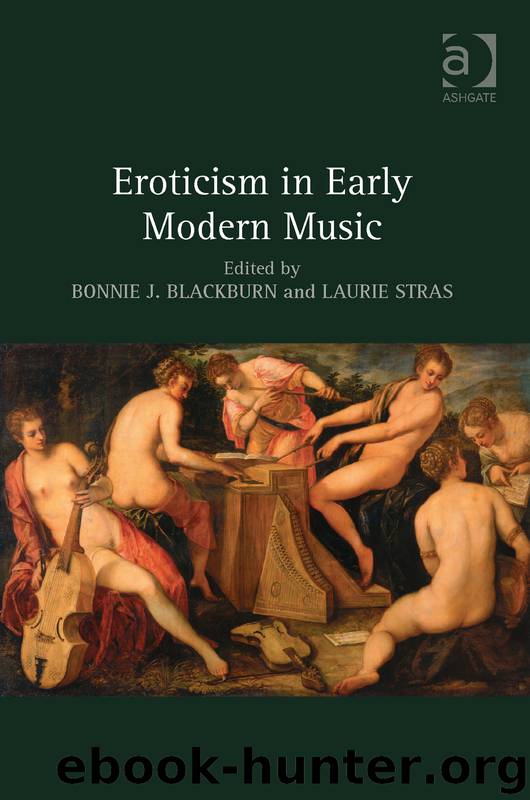Eroticism in Early Modern Music by Stras Laurie. Blackburn Bonnie J. & Laurie Stras

Author:Stras, Laurie.,Blackburn, Bonnie J. & Laurie Stras
Language: eng
Format: epub
Publisher: Taylor & Francis (CAM)
Published: 2015-03-16T04:00:00+00:00
Chapter 6
“Non è sì denso velo”: Hidden and Forbidden Practice in Wert’s Ottavo libro de madrigali a cinque voci (Venice: Gardano, 1586)
Laurie Stras
Dedicated to Duke Alfonso II d’Este, Giaches de Wert’s Ottavo libro de madrigali a cinque voci went to press in the late summer of 1586. In many ways its publication marked the apogee of a heady and optimistic period of creativity and splendor at the Ferrarese court. Although the Este had nurtured their artistic establishments throughout the century, the musical culture had burgeoned with new direction and enthusiasm after the duke’s third marriage in 1579, to Margherita Gonzaga, Princess of Mantua. Yet even as the court glittered in the sixteenth-century equivalent of a celebrity spotlight, with ambassadors’ reports flowing back to foreign princes eager to tell of Ferrarese society and chic—and particularly of Ferrarese music-making—a grimmer reality was waiting to emerge. In the seventh year of marriage and still without a direct male heir, the ageing duke lived daily with the knowledge that Ferrara was destined to revert to the Papal States upon his death. It could be that the lavishness of Alfonso’s court reflected the increasing likelihood that there would be no need to protect the patrimony; yet, as we shall see, at this stage Alfonso had not quite given up hope.1
The dedication of Wert’s book begins:
To my most serene Lord, most esteemed Lord and Patron, the Lord Duke of Ferrara, etc. I would have committed a most notable error if, in bringing into light these my musical compositions written for the most part in Ferrara, I had directed them to a person other than Your Highness—for to whom more worthy could I have dedicated them than to such a great prince, such a friend of the virtues, such a patron of the virtuous, and such a benign protector of my works [things]? And in what part of the world could these be better sung than in Your Highness’s court, where I do not know how to decide which is greater—the mastery of those who sing or the judgment of those who listen? … [T]o whom today are not notable the marvels of art and of nature, the voice, the grace, the disposition, the memory, and the other comparable and so rare qualities of the three most noble young ladies of the most serene Lady Duchess of Ferrara? In this respect alone it would be enough to induce all the composers of the world to direct their works to Your Highness, because from such divine voices and such a noble ensemble they would receive the true and natural spirit of Music.2
To modern scholars of Renaissance music, Wert’s dedication is a rich source, readily raising issues of patronage, performance, composer–performer relationships, gender, listening, and reception. And thanks significantly to the correspondence and reports that describe Ferrarese music to those keen to emulate it, it is possible to examine those issues within a detailed contemporary context, and to use them to better understand the hows and the whys of the music itself.
Download
This site does not store any files on its server. We only index and link to content provided by other sites. Please contact the content providers to delete copyright contents if any and email us, we'll remove relevant links or contents immediately.
Aircraft Design of WWII: A Sketchbook by Lockheed Aircraft Corporation(32282)
The Great Music City by Andrea Baker(31916)
Call Me by Your Name by André Aciman(20491)
The Secret History by Donna Tartt(19048)
The Art of Boudoir Photography: How to Create Stunning Photographs of Women by Christa Meola(18613)
Shoot Sexy by Ryan Armbrust(17720)
Plagued by Fire by Paul Hendrickson(17405)
Portrait Mastery in Black & White: Learn the Signature Style of a Legendary Photographer by Tim Kelly(16996)
Adobe Camera Raw For Digital Photographers Only by Rob Sheppard(16969)
Photographically Speaking: A Deeper Look at Creating Stronger Images (Eva Spring's Library) by David duChemin(16681)
Ready Player One by Cline Ernest(14639)
Pimp by Iceberg Slim(14484)
Bombshells: Glamour Girls of a Lifetime by Sullivan Steve(14052)
The Goal (Off-Campus #4) by Elle Kennedy(13657)
Art Nude Photography Explained: How to Photograph and Understand Great Art Nude Images by Simon Walden(13031)
Kathy Andrews Collection by Kathy Andrews(11812)
The Priory of the Orange Tree by Samantha Shannon(9063)
The remains of the day by Kazuo Ishiguro(8969)
Thirteen Reasons Why by Jay Asher(8893)
